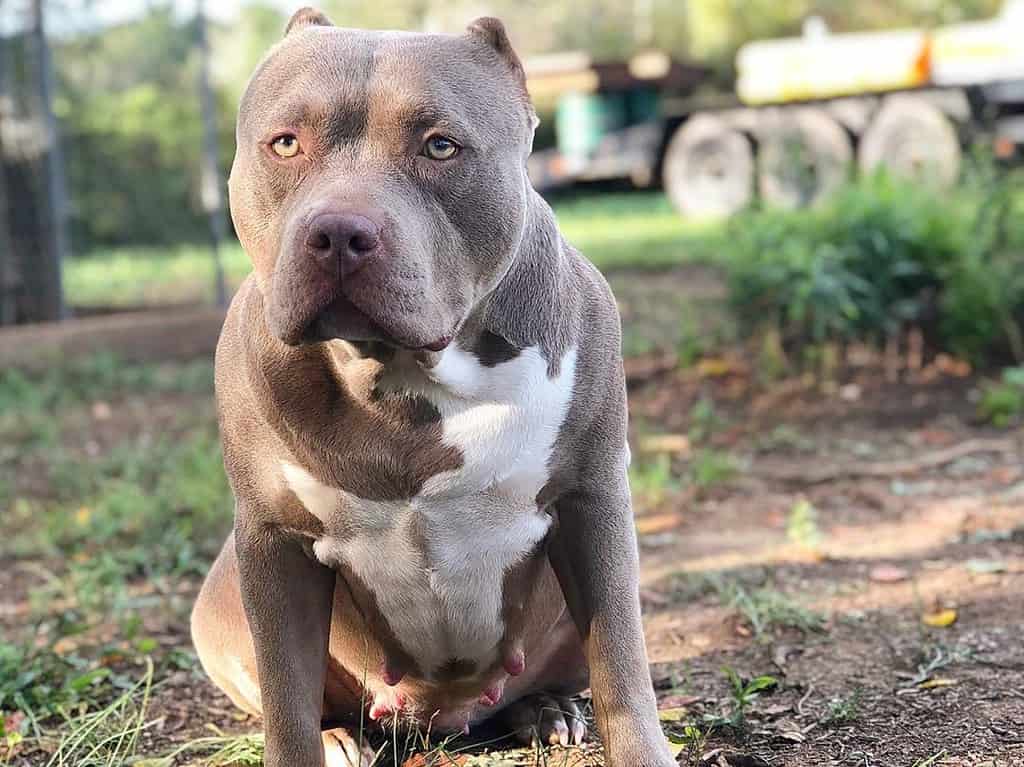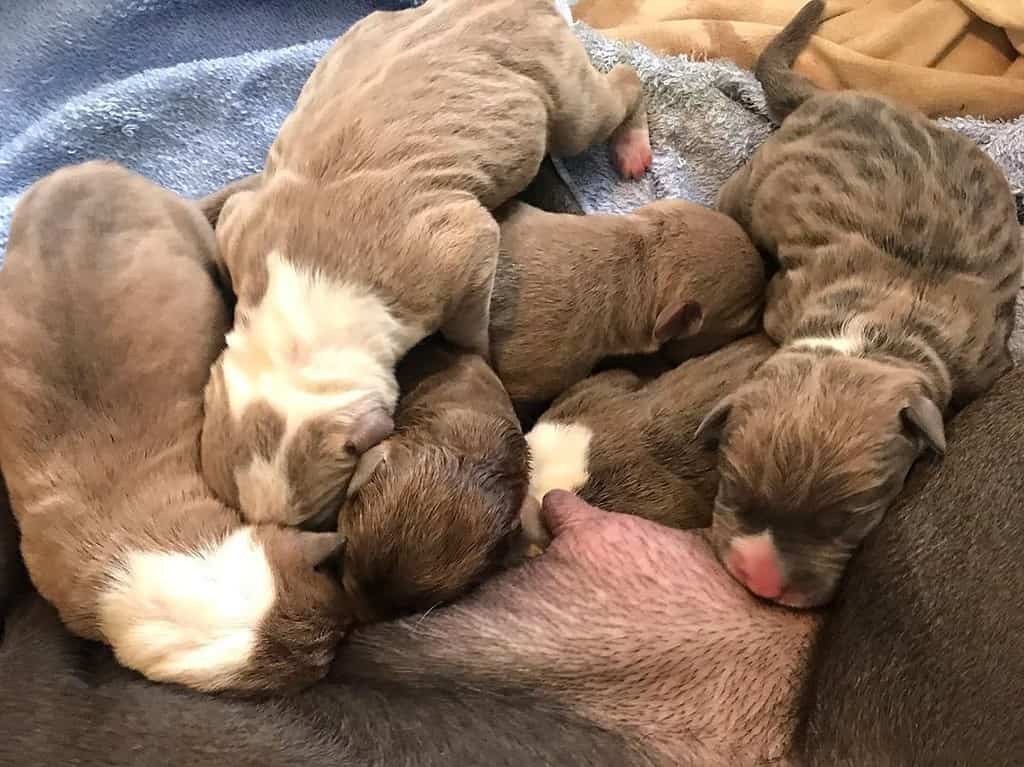So your brave Pitbull is finally pregnant. Good for you!
Pitbulls make the most loyal, affectionate, and protective pets when trained and cared for properly. We’re not surprised if you are giddy at the thought of those squared-head, wrinkly puppies running around the house.
But have you ever thought about how long you must wait to meet those pups? Knowing a Pitbull’s pregnancy timeline equips you for the litter’s arrival.
How long are Pitbulls Pregnant for? How can you tell your Pitbull is pregnant? How can you support your dog during this time? This guide answers these questions and more.

How Long Are Pitbulls Pregnant For?
Pitbulls, like most dog breeds, have a gestation period of approximately two months. During this period, the female experiences bodily and behavioral changes that indicate distinct stages of pregnancy. The initial step encompasses the mating phase when the female Pitbull enters heat and permits successful breeding. Following copulation, fertilized eggs relocate to the uterus to eventually develop until birth.
During the first weeks of pregnancy, physical changes may not be visible in the expecting Pitbull. Nonetheless, as time passes and gestation progresses, it becomes evident that her body is changing. By day thirty of pregnancy, a veterinarian can determine that conception has occurred by palpating or using ultrasound equipment. Signs of pregnancy, such as an enlarged abdomen and changing coloration/prominence of nipples, become increasingly noticeable farther along in the pregnancy.
During the second month of pregnancy, the nutritional needs of a Ptbull will significantly increase, requiring an adequately balanced diet to support the growth of her puppies. Behavioral transformations such as increased nesting behavior or heightened protection and affection may also occur. As monitoring the health of the mother dog and its growing litter would be paramount, regular vet visits must be kept throughout this period.
As the due date draws near, the expectant Pitbull’s appetite will likely diminish, and her restlessness will increase. Intensified nesting occurs as she prepares a secure and accommodating environment to give birth. A safe and tranquil environment must be provided to have her puppies comfortably.
Labor will begin on day 63. The Pitbull may demonstrate restlessness, pacing, heavy panting, and possibly the amniotic sac rupture. The birthing process can be lengthy, taking several hours and consisting of contractions followed by individual puppy births. We recommend having a veterinarian readily available to provide assistance in case any complications arise during delivery.
How To Tell If A Pitbull Is Pregnant

If a female Pitbull and a male dog have mated, and enough time has passed since then, watch out for the following signs of pregnancy:
Physical changes in a Pitbull’s body are one of the most observable indicators that she may be pregnant. Approximately 21-28 days following conception, her nipples will stick out more than usual and appear red. This is due to the body’s heightened circulation and lactation preparations. Furthermore, her belly will gradually increase in size over time, though this so-called “baby bump” can be more difficult to detect during earlier stages of pregnancy.
Changes in appetite may be observed when a Pitbull is pregnant, with some demonstrating heightened hunger and others displaying little to no interest in food. Additionally, the mother-to-be may appear lethargic or restless due to shifts in energy levels. It is also common for expectant mothers of this breed to exhibit nesting behaviors, where private and comfortable places are sought out in preparation for birthing puppies.
But that’s not all. A pregnant Pitbull may experience physical discomforts due to hormonal changes and symptoms similar to morning sickness, such as nausea and throwing up. Additionally, the increased size of her litter can lead to increased urination.
A visit to the veterinarian is required for a definitive diagnosis of pregnancy, which will guarantee the health and safety of both the mother and potential offspring. The veterinarian may use palpation or ultrasound scans to detect any developing puppies, while blood tests can also be performed to measure hormonal levels, providing further verification.
Caring For A Pregnant Pitbull
During pregnancy, adequate nutrition, regular veterinary examinations, proper exercise, and a secure and accommodating environment are paramount for the health of a pregnant Pitbull.
Nutrition
The biological processes that occur during the mother dog’s gestation include forming of the placenta, organs growing in size and development, and the embryo’s skeleton developing. Her biological system must be provided with sufficient vital nutrients like minerals, vitamins, fats, carbohydrates, and proteins for these changes to happen successfully. Protein is essential, as lacking this nutrient may increase the likelihood of birth defects or result in physically weak puppies.
Furthermore, a pregnant Pitbull should consume nutritious meals regularly. Without proper nutrition, her body may be unable to combat the stress of pregnancy, low energy levels, low immunity, etc. By properly dieting and monitoring her nutritional requirements through all stages of development, the mother will be better equipped for labor and delivery.
After the birth of pups, Pitbull moms must produce a high content of nutrient-dense milk to accommodate their rapidly developing puppies. If nutritional needs are not met during pregnancy, the mother may be unable to provide enough sustenance for her offspring, causing poor growth and health issues for the puppies. Conversely, when a mother is sufficiently looked after nutritionally throughout her pregnancy, she can provide essential nutrients through her milk that will assist with healthy weight gain and successful maturity in the puppies.
Veterinary Care
Monitor the weight gain of a Pitbull through regular veterinary visits due to complications associated with being overweight and underweight. Through a professional evaluation of the mother’s current weight and fitness level, adjustments to diet and exercise plan can be made if needed, thus maximizing the health and safety of all involved.
As well as keeping an eye on the pregnant Pitbull’s weight, you should monitor its health closely during pregnancy and check for any indications of sickness or infection. For example, brucellosis and canine herpesvirus present significant risks to unborn puppies, so testing for these and similar illnesses and administering vaccinations are essential preventative measures veterinarians recommend.
As gestation progresses, veterinarians may conduct ultrasounds to assess the puppies’ physical condition and overall development. The primary advantage of this technique is that it can allow for the early detection of any issues or complications, such as stunted growth and fetal distress. Limiting potential risks can maximize the survival rates for the pups and mother dog.
When the Pregnant Pitbull is nearing its due date, it is recommended that a veterinarian be consulted to ensure the ideal environment and support is available for the whelping process.
Exercise
A Pitbull will experience physical stress and fatigue during pregnancy as her body changes significantly. Exercise benefits her health, strengthening muscles and joints while boosting cardiovascular function and controlling weight gain. By engaging in regular exercise throughout the pregnancy, the dog can better manage the effects of pregnancy and be ready for labor and delivery when it occurs.
Additionally, physical activity is a prerequisite for maintaining a pregnant Pitbull’s mental and emotional health. Similar to humans, dogs are subject to episodes of tension and anxiety. Routine exercise decreases stress levels, advancing mental enrichment, which is overwhelmingly beneficial during pregnancy. It hinders monotony and frustration by providing an adequate channel through which additional energy may be released, reducing the odds of destructive behavior.
Again, engaging in moderate exercise when pregnant benefits puppies’ proper growth and development. It promotes healthy blood circulation throughout the mother’s body, delivering vital oxygen and nutrients to her uterus. This helps protect against complications such as excessive weight gain, obesity, or other potential issues which could adversely affect both mother and offspring.
Safe and Comfortable Space
Providing a secure and safe area for the pregnant Pitbull is essential to reduce the possibility of potential accidents or injuries that could harm her. During this time, it is imperative to note that the dog’s body undergoes drastic physical changes making her more prone to falls or collisions. Accidents can be prevented by utilizing a whelping box or allocating an appropriate space in the home for this purpose.
A comfortable living space is equally significant for a pregnant Pitbull. Her body is undergoing drastic physical changes such as weight gain and hormonal changes. An area conducive to rest will ensure the best mental and physical health for the pregnant Pitbull. This necessity should become even more evident towards the end of gestation when energy levels decline and extra rest times are required.
Accordingly, a safe and comfortable space for a pregnant dog prevents anxiety. This, in turn, ensures that fetuses are developing properly, increasing the chances of successful births.
Preparing For Labor And Delivery
A clean whelping box that allows ample space and movement should be prepared. It should also feature low sides so it will be easier for the puppies to access once born. Additionally, this section must be situated in a tranquil setting away from loud disturbances while she nurses her puppies.
You should also be adequately equipped to handle any sudden issues during delivery. A birthing kit should include supplies that provide warmth and the capability to absorb fluids, such as clean towels or bedding; sterile gloves; scissors in case it’s needed to cut the umbilical cord; and antiseptic solutions used for disinfecting the puppies and their mother.
During labor, remain composed and provide support for your Pitbull. Offer comfort and reassurance, but avoid intervening unless there is a visible indication of distress or difficulties. Delivery may be brief or sometimes take several hours, depending on the litter size and individual conditions. It usually begins with severe contractions followed by the birth of each pup in succession.
Pitbulls are typically able to give birth by themselves. However, it pays to be vigilant and prepared to seek professional help if assistance is needed during a Pitbull’s labor. This means having your vet’s contact information readily available.
Following the birth of her puppies, the mother’s instinct is to clean and feed them. At this time, there may be fluid or mucus present in the newborns’ airways that can obstruct their breathing. The consistent licking motion of the mother serves to clear any nasal passages, allowing unrestricted airflow and successful respiration. Do not intervene unless you observe that the newborn puppy does not start breathing within a few seconds.
Aftercare: Caring for Pitbull Mom and Puppies
Following the birthing process, the female Pitbull should be given time to recover and establish a connection with her puppies.
The mother’s nutritional needs should be catered to. She requires a nutrient-rich diet to accommodate her heightened energy expenditure during lactation. Ask your vet what type of food, how much, and how often it should be consumed to ensure the necessary levels of dietary nutrients are maintained.
Likewise, upholding proper hygiene standards during this time is crucial to minimize the risk of infectious diseases. Change the bedding and disinfect the whelping area regularly to prevent contamination of germs. Also, monitor the mother’s genitalia for any signs of discharge or infection.

As for the puppies, they are heavily reliant on their mother for nourishment during the initial weeks of life. Make sure they are correctly latching onto their mother’s nipples and receiving enough milk. Monitor their weight gain; consult your vet if you think the puppy is not gaining weight or too much.
And the last vital part of postpartum aftercare: socialization. Introduce both the mother and puppies to humans gradually to cultivate positive attachments. But be sure to remind your family to be gentle when handling these delicate pups!




